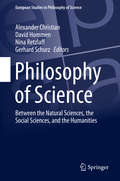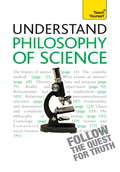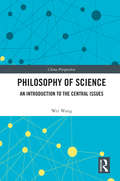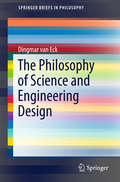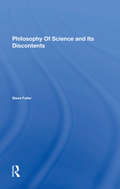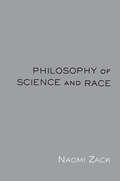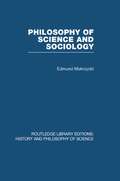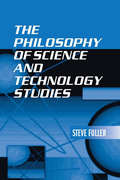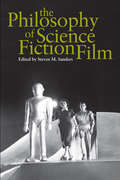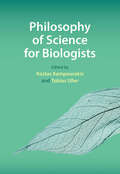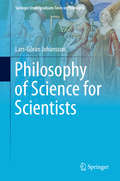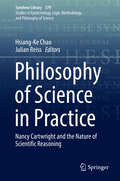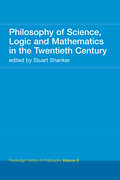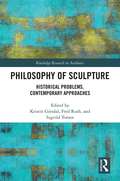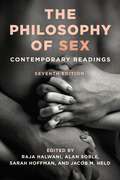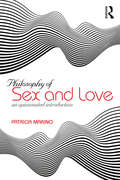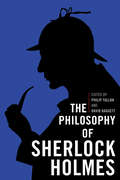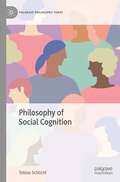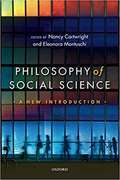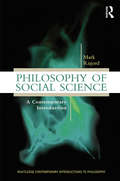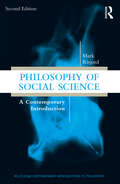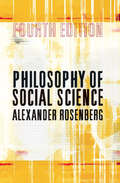- Table View
- List View
Philosophy of Science: A Unified Approach (European Studies In Philosophy Of Science Ser. #9)
by Gerhard Schurz Nina Retzlaff David Hommen Alexander ChristianThis broad and insightful book presents current scholarship in important subfields of philosophy of science and addresses an interdisciplinary and multidisciplinary readership. It groups carefully selected contributions into the four fields of I) philosophy of physics, II) philosophy of life sciences, III) philosophy of social sciences and values in science, and IV) philosophy of mathematics and formal modeling. Readers will discover research papers by Paul Hoyningen-Huene, Keizo Matsubara, Kian Salimkhani, Andrea Reichenberger, Anne Sophie Meincke, Javier Suárez, Roger Deulofeu, Ludger Jansen, Peter Hucklenbroich, Martin Carrier, Elizaveta Kostrova, Lara Huber, Jens Harbecke, Antonio Piccolomini d’Aragona and Axel Gelfert. This collection fosters dialogue between philosophers of science working in different subfields, and brings readers the finest and latest work across the breadth of the field, illustrating that contemporary philosophy of science has successfully broadened its scope of reflection. It will interest and inspire a wide audience of philosophers as well as scholars of the natural sciences, social sciences and the humanities. The volume shares selected contributions from the prestigious second triennial conference of the German Society for Philosophy of Science/ Gesellschaft für Wissenschaftsphilosophie (GWP.2016, March 8, 2016 – March 11, 2016).
Philosophy of Science: Teach Yourself
by Mel ThompsonA modern understanding of the world is unthinkable without science, but what exactly is it? What does it mean to say that something is 'scientific'? How are its results justified? From the genetic basis of life, to the structures of the universe and the atom, TEACH YOURSELF PHILOSOPHY OF SCIENCE explores how the key ideas that shape our world have been developed.- Investigate the history of science.- Examine scientific method.- Discover key philosophers and scientists.- Explore the impact of science on Western thought.
Philosophy of Science: An Introduction to the Central Issues (China Perspectives)
by Wang WeiThe book is a translation of the second edition of a much-used and research-based Chinese textbook. As a succinct and issue-based introduction to the Western philosophy of science, the book brings eight focal issues in the field to the fore and augments each topic by incorporating Chinese perspectives. Followed by an overview of the historical framework and logical underpinnings of the philosophy of science, the book thoroughly discusses eight issues in the discipline: (1) the criteria of cognitive meaning, (2) induction and confirmation, (3) scientific explanation, (4) theories of scientific growth, (5) the demarcation between science and pseudoscience, (6) scientific realism and empiricism; (7) the philosophy of scientific experimentation, (8) science and value. Not confined to Western mainstream discourse in this field, the book also introduces voices of Chinese philosophers of note and adopts a stance that productively combines logical empiricism and Kuhnianism, both of which tend to be covered in less detail by many English language textbooks. In the final chapter the author offers a prognosis regarding the future of the discipline based on recent trends.This book will be of value to students who study philosophy of science and hope to gain a better understanding of science and technology.
The Philosophy of Science and Engineering Design
by Dingmar Van EckThis book discusses the relationship between the philosophy of science and philosophy of engineering, and demonstrates how philosophers of engineering design as well as design researchers can benefit from the conceptual toolkit that the philosophy of science has to offer. In this regard, it employs conceptual tools from the philosophical literature on scientific explanation to address key issues in engineering design and philosophy of engineering design. Specifically, the book focuses on assessing the explanatory value of function ascriptions used in engineering design and philosophy of technical functions; on elaborating the structure of explanation in engineering design; on assessing the role and value of design representations in engineering design and philosophy thereof; and on elaborating means for the testing of design methods. Presenting a novel and effective approach to tackling key issues in the field, philosophers of engineering and design alike will greatly benefit from this book.
Philosophy Of Science And Its Discontents
by Steve FullerThe most important and exciting recent development in the philosophy of science is its merging with the sociology of scientific knowledge. Here is the first text book to make this development available.
Philosophy of Science and Race
by Naomi ZackFirst published in 2003. Routledge is an imprint of Taylor & Francis, an informa company.
Philosophy of Science and Sociology: From the Methodological Doctrine to Research Practice (Routledge Library Editions: History & Philosophy of Science)
by Edmund MokrzyckiOriginally published in 1983. This book concentrates on the impact of philosophy of science on sociology and other disciplines. It argues that the impact of the philosophy of science on sociology from the rise of the Vienna Circle until the mid-1980s resulted in a deep-reaching and, in the author’s view, undesirable methodological reorientation in sociology.
The Philosophy of Science and Technology Studies: A New Beginning For Science And Technology Studies
by Steve FullerAs the field of Science and Technology Studies (STS) has become more established, it has increasingly hidden its philosophical roots. While the trend is typical of disciplines striving for maturity, Steve Fuller, a leading figure in the field, argues that STS has much to lose if it abandons philosophy. In his characteristically provocative style, he offers the first sustained treatment of the philosophical foundations of STS and suggests fruitful avenues for further research. With stimulating discussions of the Science Wars, the Intelligent Design Theory controversy, and theorists such as Donna Haraway and Bruno Latour, Philosophy of Science and Technology Studies is required reading for students and scholars in STS and the philosophy of science.
The Philosophy of Science Fiction Film (The\philosophy Of Popular Culture Ser.)
by Steven M. SandersThe science fiction genre maintains a remarkable hold on the imagination and enthusiasm of the filmgoing public, captivating large audiences worldwide and garnering ever-larger profits. The Philosophy of Science Fiction Film explores the storylines, conflicts, and themes of fifteen science fiction film classics, from Metropolis to The Matrix. Editor Steven M. Sanders and a group of outstanding scholars in philosophy, film studies, and other fields raise science fiction film criticism to a new level by penetrating the surface of the films to expose the underlying philosophical arguments, ethical perspectives, and metaphysical views.
Philosophy of Science for Biologists
by Kostas Kampourakis Tobias UllerBiologists rely on theories, apply models and construct explanations, but rarely reflect on their nature and structure. This book introduces key topics in philosophy of science to provide the required philosophical background for this kind of reflection, which is an important part of all aspects of research and communication in biology. It concisely and accessibly addresses fundamental questions such as: Why should biologists care about philosophy of science? How do concepts contribute to scientific advancement? What is the nature of scientific controversies in the biological sciences? Chapters draw on contemporary examples and case studies from across biology, making the discussion relevant and insightful. Written for researchers and advanced undergraduate and graduate students across the life sciences, its aim is to encourage readers to become more philosophically minded and informed to enable better scientific practice. It is also an interesting and pertinent read for philosophers of science.
Philosophy of Science for Scientists
by Lars-Göran JohanssonThis textbook offers an introduction to the philosophy of science. It helps undergraduate students from the natural, the human and social sciences to gain an understanding of what science is, how it has developed, what its core traits are, how to distinguish between science and pseudo-science and to discover what a scientific attitude is. It argues against the common assumption that there is fundamental difference between natural and human science, with natural science being concerned with testing hypotheses and discovering natural laws, and the aim of human and some social sciences being to understand the meanings of individual and social group actions. Instead examines the similarities between the sciences and shows how the testing of hypotheses and doing interpretation/hermeneutics are similar activities. The book makes clear that lessons from natural scientists are relevant to students and scholars within the social and human sciences, and vice versa. It teaches its readers how to effectively demarcate between science and pseudo-science and sets criteria for true scientific thinking. Divided into three parts, the book first examines the question What is Science? It describes the evolution of science, defines knowledge, and explains the use of and need for hypotheses and hypothesis testing. The second half of part I deals with scientific data and observation, qualitative data and methods, and ends with a discussion of theories on the development of science. Part II offers philosophical reflections on four of the most important concepts in science: causes, explanations, laws and models. Part III presents discussions on philosophy of mind, the relation between mind and body, value-free and value-related science, and reflections on actual trends in science.
Philosophy of Science in Practice
by Hsiang-Ke Chao Julian ReissThis volume reflects the 'philosophy of science in practice' approach and takes a fresh look at traditional philosophical problems in the context of natural, social, and health research. Inspired by the work of Nancy Cartwright that shows how the practices and apparatuses of science help us to understand science and to build theories in the philosophy of science, this volume critically examines the philosophical concepts of evidence, laws, causation, and models and their roles in the process of scientific reasoning. Each chapter is an important one in the philosophy of science, while the volume as a whole deals with these philosophical concepts in a unified way in the context of actual scientific practice. This volume thus aims to contribute to this new direction in the philosophy of science.
Philosophy of Science, Logic and Mathematics in the 20th Century: Routledge History of Philosophy Volume 9
by Stuart G. ShankerThe twentieth century witnessed the birth of analytic philosophy. This volume covers some of its key movements and philosophers, including Frege and Wittgenstein's Tractatus.
Philosophy of Science: Teach Yourself
by Mel ThompsonA modern understanding of the world is unthinkable without science, but what exactly is it? What does it mean to say that something is 'scientific'? How are its results justified? From the genetic basis of life, to the structures of the universe and the atom, TEACH YOURSELF PHILOSOPHY OF SCIENCE explores how the key ideas that shape our world have been developed.- Investigate the history of science.- Examine scientific method.- Discover key philosophers and scientists.- Explore the impact of science on Western thought.
Philosophy of Sculpture: Historical Problems, Contemporary Approaches (Routledge Research in Aesthetics)
by Kristin GjesdalSculpture has been a central aspect of almost every art culture, contemporary or historical. This volume comprises thirteen essays at the cutting edge of thinking about sculpture in philosophical terms, representing approaches to sculpture from the perspectives of both Anglo-American and European philosophy. Some of the essays are historically situated, while others are more straightforwardly conceptual. All of the essays, however, pay strict attention to actual sculptural examples in their discussions. This reflects the overall aim of the volume to not merely "apply" philosophy to sculpture, but rather to test the philosophical approaches taken in tandem with deep analyses of sculptural examples. There is an array of philosophical problems unique to sculpture, namely certain aspects of its three-dimensionality, physicality, temporality, and morality. The authors in this volume respond to a number of challenging philosophical questions related to these characteristics. Furthermore, while the focus of most of the essays is on Western sculptural traditions, there are contributions that features discussion of sculptural examples from non-Western and archaic sources. Philosophy of Sculpture is the first full-length book treatment of the philosophical significance of sculpture in English. It is a valuable resource for advanced students and scholars across aesthetics, art history, history, performance studies, and visual studies.
The Philosophy of Sex: Contemporary Readings
by Raja Halwani Alan Soble Sarah Hoffman Jacob HeldThe seventh edition of The Philosophy of Sex has quite a few changes. First, it has nine new essays specifically written for this volume: Talia Mae Bettcher's "Trans 101" and Burkay Ozturk's "The Negotiative Theory of Gender Identity and the Limits of First-Person Authority" deal with transgender issues, the former going over some basics and the latter questioning the view that a person has a non-defeasible epistemic and ethical decision regarding what their gender is. The seventh edition has three essays that are new to the volume, though they have been published elsewhere before and also has three revised essays from the sixth one.
Philosophy of Sex and Love: An Opinionated Introduction
by Patricia MarinoWriting for non-specialists and students as well as for fellow philosophers, this book explores some basic issues surrounding sex and love in today's world, among them consent, objectification, non-monogamy, racial stereotyping, and the need to reconcile contemporary expectations about gender equality with our beliefs about how love works. Author Patricia Marino argues that we cannot fully understand these issues by focusing only on individual desires and choices. Instead, we need to examine the social contexts within which choices are made and acquire their meanings. That perspective, she argues, is especially needed today, when the values of individualism, self-expression, and self-interest permeate our lives. Marino asks how we can fit these values, which govern so many areas of contemporary life, with the generosity, caring, and selflessness we expect in love and sex. Key Features of Philosophy of Sex and Love: An Opinionated Introduction Offers a contemporary, problems-based approach to the subject, helping readers better understand and address current issues and controversial questions Includes coverage of sex and love as they intersect with topics like disability, race, medicine, and economics Considers not only the ethical, but also the broadly social and political dimensions of sex and love Includes a helpful introduction and conclusion in each chapter and is written throughout in a clear and straightforward style, with examples and signposts to help guide the student and general reader A comprehensive and up-to-date bibliography provides a valuable tool for anyone’s further research
The Philosophy of Sherlock Holmes (The Philosophy of Popular Culture)
by David Baggett Philip TallonArguably the most famous and recognized detective in history, Sherlock Holmes is considered by many to be the first pop icon of the modern age. Sir Arthur Conan Doyle's fictional detective has stood as a unique figure for more than a century with his reliance on logical rigor, his analytic precision, and his disregard of social mores. A true classic, the Sherlock Holmes character continues to entertain twenty-first-century audiences on the page, stage, and screen.In The Philosophy of Sherlock Holmes, a team of leading scholars use the beloved character as a window into the quandaries of existence, from questions of reality to the search for knowledge. The essays explore the sleuth's role in revealing some of the world's most fundamental philosophical issues, discussing subjects such as the nature of deception, the lessons enemies can teach us, Holmes's own potential for criminality, and the detective's unique but effective style of inductive reasoning. Emphasizing the philosophical debates raised by generations of devoted fans, this intriguing volume will be of interest to philosophers and Holmes enthusiasts alike.
Philosophy of Social Cognition (Palgrave Philosophy Today)
by Tobias SchlichtThis introductory textbook provides a comprehensive and up-to-date overview of the main issues in contemporary philosophy of social cognition. It explains and critically discusses each of the key philosophical answers to the captivating question of how we understand the mental life of other sentient creatures. Key Features:· Clearly and fully describes the major theoretical approaches to the understanding of other people’s minds.· Suggests the major advantages and limitations of each approach, indicating how they differ as well as the ideas they have in common. · Tests each philosophical theory against the best available empirical data from psychology, neuroscience and psychopathology.· Includes suggestions for additional reading and practice study questions at the end of each chapter. Philosophy of Social Cognition is essential reading for all undergraduate and graduate students taking introductory courses on social cognition. It is also ideal for courses on cognitive neuroscience, social psychology and sociological theory.
Philosophy of Social Science: A New Introduction
by Nancy Cartwright Eleanora MontuschiThis is a much-needed new introduction to a field that has been transformed in recent years by exciting new subjects, ideas, and methods. It is designed both for students with central interests in philosophy and those planning to concentrate on the social sciences, and it presupposes no particular background in either domain. From the wide range of topics at the forefront of debate in philosophy of social science, the editors have chosen those which are representative of the most important and interesting contemporary work. A team of distinguished experts explore key aspects of the field such as social ontology (what are the things that social science studies?), objectivity, formal methods, measurement, and causal inference. Also included are chapters focused on notable subjects of social science research, such as well-being and climate change. Philosophy of Social Science provides a clear, accessible, and up-to-date guide to this fascinating field.
The Philosophy of Social Science: An introduction
by Martin HollisThis textbook by Martin Hollis offers an exceptionally clear and concise introduction to the philosophy of social science. It examines questions which give rise to fundamental philosophical issues. Are social structures better conceived of as systems of laws and forces, or as webs of meanings and practices? Is social action better viewed as rational behaviour, or as self-expression? By exploring such questions, the reader is led to reflect upon the nature of scientific method in social science. Is the aim to explain the social world after a manner worked out for the natural world, or to understand the social world from within?
Philosophy of Social Science: A Contemporary Introduction (Routledge Contemporary Introductions to Philosophy)
by Mark RisjordThe Philosophy of Social Science: A Contemporary Introduction examines the perennial questions of philosophy by engaging with the empirical study of society. The book offers a comprehensive overview of debates in the field, with special attention to questions arising from new research programs in the social sciences. The text uses detailed examples of social scientific research to motivate and illustrate the philosophical discussion. Topics include the relationship of social policy to social science, interpretive research, action explanation, game theory, social scientific accounts of norms, joint intentionality, reductionism, causal modeling, case study research, and experimentation.
Philosophy of Social Science: A Contemporary Introduction (Routledge Contemporary Introductions to Philosophy)
by Mark RisjordPhilosophy of Social Science: A Contemporary Introduction examines perennial questions of philosophy through engaging the empirical study of society. Questions of normativity concern the place of values in social scientific inquiry. Questions of naturalism concern the relationship between the natural and the social sciences. And questions of reductionism ask how social institutions relate to the people who constitute them. This accessible text offers a comprehensive overview of debates in the field, with special attention to new research programs. Topics include the relationship of social policy to social science, interpretive research, cognitive and evolutionary explanations, intentional action explanation, rational choice theory, conventions and social norms, joint intentionality, causal inference, and experimentation. Detailed examples of social scientific research motivate the philosophical questions and illustrate the important concepts. Treating philosophical commitments as implicit in social science, students of the social sciences will benefit from its application of philosophical argument to methodological and theoretical problems. The text argues that social science transforms philosophical questions, and students of philosophy will benefit from its direct engagement with contemporary debates. The Second Edition provides updates with the most recent literature and adds two new chapters: one on modeling and one on the role of race and gender in the social sciences. Key Updates to the Second Edition: A new chapter on "Modeling and Explaining," which explores how models represent social systems and whether highly idealized models explain A new chapter on "Race and Other Social Constructions," capturing much of the recent empirical research and philosophical interest in the social construction of categories like race and gender Revised and updated chapters throughout, clarifying earlier presentations and bringing discussions from the First Edition into line with new research Updated annotated Further Reading lists, which now include relevant publications from 2013 to 2022.
Philosophy of Social Science
by Alexander RosenbergPhilosophy of Social Science provides a tightly argued yet accessible introduction to the philosophical foundations of the human sciences, including economics, anthropology, sociology, political science, psychology, history, and the disciplines emerging at the intersections of these subjects with biology. Philosophy is unavoidable for social scientists because the choices they make in answering questions in their disciplines force them to take sides on philosophical matters. Conversely, the social and behavior sciences must inform philosophers’ understanding of human action, norms, and social institutions. The fourth edition retains an illuminating interpretation of the enduring relations between the social sciences and philosophy, and it has now been thoroughly revised to better fit courses, including fifteen chapters, with more effective transitions and helpful summaries. This edition also includes three new chapters on philosophical anthropology, functionalism as a research program, and theories of cultural evolution, as well as enhanced discussions of the role of norms and speech acts in social construction in interpretive social science and a chapter on continental philosophers of social science.
Philosophy of Social Science
by Alexander RosenbergRosenberg (philosophy, Duke U. ) introduces students to the philosophical foundations of the human sciences, including economics, anthropology, sociology, political science, psychology, history, and fields at the intersections of these subjects with biology. He discusses the relevance of philosophy, then the problems raised by alternative explanatory strategies, including behaviorism, structuralism, and interpretational theories like critical theory, as well as the relationship between social sciences and moral philosophy. Reorganized into 15 chapters, this edition has new chapters on philosophical anthropology, functionalism as a research program, and theories of cultural evolution; more on the role of norms and speech acts in social construction, including the work of John Searle; more on interpretive social science and continental philosophers with an expanded discussion of the critical theories of those such as Habermas, Foucault, and Bourdieu; new discussion of the role of models and equilibrium explanations in economics and the problem of spontaneous order in the creation of institutions; more on invisible hand explanations and rational choice theory in economics and political science; and an overview of Sen's capacities alternative to utilitarianism and Rawls' and other theories of development. Annotation ©2012 Book News, Inc. , Portland, OR (booknews. com)
